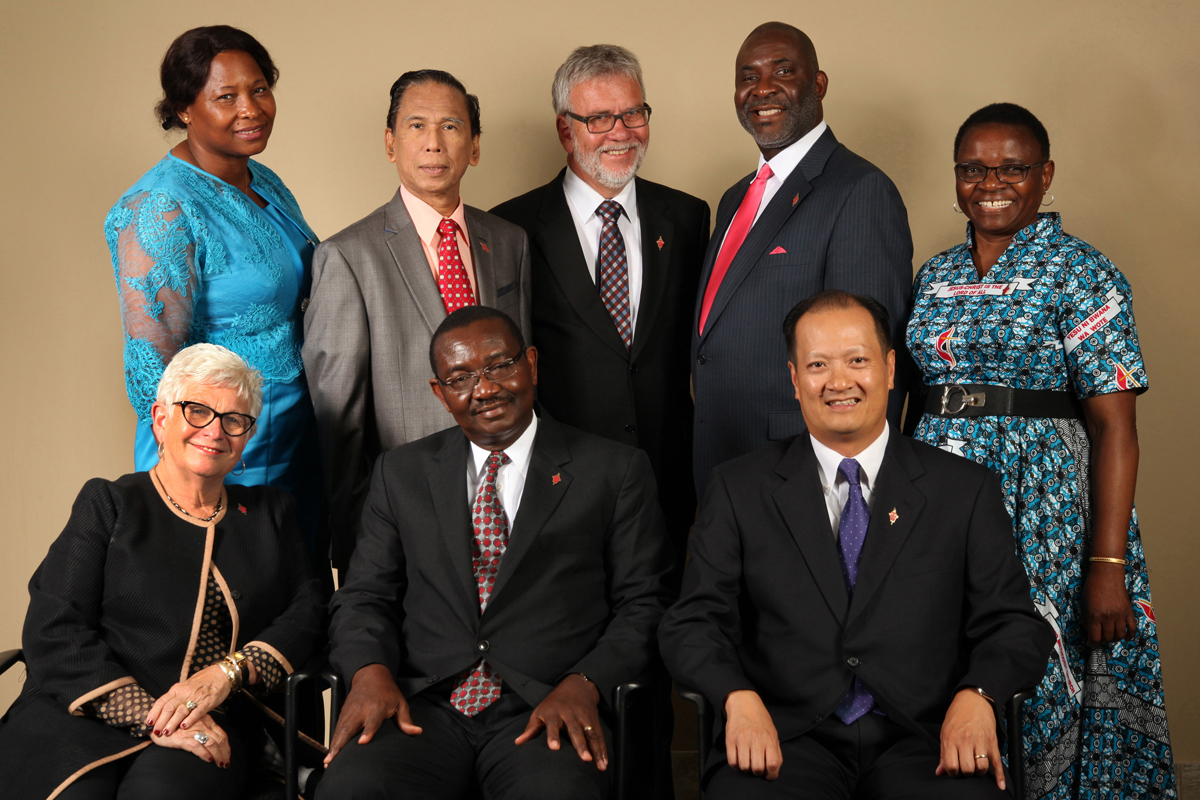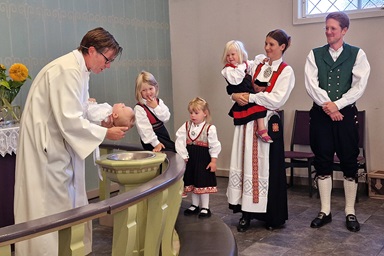Key points:
- The United Methodist Judicial Council has issued the final rulings of its fall docket.
- One decision says a provision in the Book of Discipline, the denomination’s policy book, should be amended to comply with the denomination’s constitution.
- Looking ahead, the church court faces more questions related to disaffiliations.
The United Methodist Church’s top court released three decisions June 6, including one saying a provision of church law should be amended to comply with the denomination’s constitution.
That provision in the Book of Discipline — the denomination’s policy book — deals with how long young adults must be United Methodists before they are eligible to be elected to annual conference.
With these three rulings, the Judicial Council no longer has any items pending on its fall 2021 docket. The church court already has started a new docket that includes two items related to disaffiliations.
All three decisions released June 6 stem from questions of church law raised during 2020 and 2021 sessions of annual conferences — church regional bodies that meet at least yearly.
Bishops routinely face such questions during the sessions at which they preside. The Book of Discipline requires that any bishop’s decision of law must go before the Judicial Council for review.
Subscribe to our
e-newsletter
In Decision 1427, the review of one bishop’s ruling led the church court to identify a problem with Paragraph 602.4(a) in the Discipline.
At issue is how that paragraph conflicts with another paragraph in The United Methodist Church’s constitution that deals with who can vote at annual conferences. The denomination has 53 annual conferences within its U.S. jurisdictions and 80 annual conferences within its central conferences — church regions in Africa, Europe and the Philippines.
The denomination’s constitution states in Paragraph 32 that lay members elected to annual conference must be United Methodist members for at least two years and active participants in The United Methodist Church for at least four years. However, the constitution makes an exception to that requirement for people under 30 in central conferences.
Paragraph 32 puts it this way: “In the annual conferences of the central conferences, the four-year participation and the two-year membership requirements may be waived by the annual conference for young persons under thirty (30) years of age. Such persons must be professing members of The United Methodist Church and active participants at the time of election.”
However, the way Paragraph 602.4(a) is written makes that exception appear to extend to all annual conferences.
“In the annual conference or central conferences, the four-year participation and the two-year membership requirements may be waived for young persons under thirty years of age,” Paragraph 602.4(a) says, with the church court bolding where the paragraph differs from its constitutional counterpart.
In short, the “of” in the constitutional provision conflicts with the “or” in the latter Disciplinary provision. The difference may be an unintentional typo. But whenever such conflicts occur, the Judicial Council consistently holds that the constitution supersedes other parts of church law.
“We also note that ¶ 602.4(a) has been part of the Book of Discipline for a protracted period and has not been challenged until now,” the church court said. “However, legislation cannot abrogate or violate the Constitution.”
Therefore, “¶ 602.4(a) should be amended so as to comply with, and mirror, the Constitution's provisions in ¶ 32,” the Judicial Council concluded.
Five of the nine Judicial Council members voted to void the part of Paragraph 602.4(a) at issue as unconstitutional. However, the Discipline requires the vote of at least six members to declare any act of General Conference — the denomination’s top lawmaking assembly — as unconstitutional. For that reason, Decision 1427 does not say the paragraph violates the constitution.
The Judicial Council reached its determination while reviewing a decision of law by Indiana Conference Bishop Julius Trimble about changes the conference made to its rules in 2020. The rules in question dealt with how the conference handles the election of General Conference and jurisdictional conference delegates.
With Decision 1427, the church court affirmed in part and reversed in part a decision of law by Trimble.
Judicial Council members Beth Capen and the Rev. Kabamba Kiboko wrote a separate concurrence, adding a bit more historical context to the decision.
In Decision 1436, the Judicial Council reversed another decision by Trimble to strike down an amendment to the new conference rules stating that, “only laity may vote in district conference ballots to endorse laypeople willing to serve as General Conference delegates.” Trimble said the change restricted clergy voting privileges.
The church court noted that the denomination’s constitution establishes the principle that only clergy vote for clergy delegates and only laity vote for lay delegates to General Conference. The annual conference was within its rights to apply this principle to district conferences, the Judicial Council said.
In Indiana, district conferences endorse laity and clergy candidates to serve as delegates to General Conference and jurisdictional conference. It is then up to the Indiana Annual Conference as a whole to elect delegates.
“An annual conference may adopt rules and regulations for the voting process in the district conference that are not in conflict with The Discipline,” the church court concluded. “Such policies may specifically require that clergy members vote for clergy candidates and lay members for lay candidates in the district conference.”
In a separate opinion, Judicial Council member Capen cited multiple Judicial Council precedents to reach the conclusion that the district nomination process for laity should not be happening in the first place. Endorsing lay candidates at the district level goes against the denomination’s constitution, she wrote.
“It is a violation of the Constitution when the Annual Conference is convened and Annual Conference Lay Members are informed that the nomination process has already occurred,” Capen wrote.
“It is also a violation of the Constitution when the Annual Conference Lay Members are provided with an official slate of eligible candidates that have been categorized in any manner whatsoever, including indications of endorsement by Districts or other Boards or Committees.”
In a matter unrelated to Indiana Annual Conference rules, the Judicial Council affirmed a decision of law by Greater New Jersey Conference Bishop John Schol.
In Decision 1426, the Judicial Council agreed with the bishop that the submitted record did not support the presuppositions underlying a lay member’s questions.
A lay member raised the questions during a special session of the Greater New Jersey Annual Conference on Jan. 22, 2021, that addressed conference budgetary issues.
The Judicial Council ruled that a lay member’s questions contained assertions about the conference’s process that did not match what the conference showed in its records. The church court also stressed that “fiscal and other matters not germane to the request should properly come under the oversight authority of the annual conference and bodies specifically assigned by The Discipline.”
The Rev. Dennis Blackwell, Judicial Council member, recused himself from deliberating on the decision because he is a member of the Greater New Jersey Conference.
Looking ahead, the church court is facing more questions from bishops about annual conference and church disaffiliations. The bishops are dealing with the ramification of the launch of a breakaway denomination, the Global Methodist Church.
The Judicial Council has previously ruled on questions related to the Discipline’s Paragraph 2553, a new church law that allows individual churches — if they meet certain financial and procedural requirements — to leave with property. The church court also has ruled that U.S. annual conferences cannot withdraw from the denomination under current church law.
The first item on the Judicial Council’s current docket concerns whether an annual conference outside the United States has the authority to vote to separate from The United Methodist Church. In April, the Bulgaria-Romania Provisional Annual Conference passed a resolution that says the body “withdraws from and severs all ties, legal or otherwise, with The United Methodist Church as of 1 May 2022 and immediately becomes an annual conference of the Global Methodist Church… .”
Bishop Patrick Streiff, whose area includes the conference, said conference members took the vote “without legal basis in the Book of Discipline.” His decision of law is before the Judicial Council.
Opening briefs for this docket item are due June 13 and reply briefs on June 24.
In the second docket item, the Council of Bishops has asked the Judicial Council to rule on the meaning and application of the Discipline’s Paragraph 2548.2. The paragraph deals with the deeding of church property to another denomination.
Multiple annual conferences have received resolutions urging that this paragraph be used for churches that wish to move to the Global Methodist Church.
Briefs are due June 23, and reply briefs are due June 30.
The Book of Discipline requires the Judicial Council to accept briefs for at least 30 days before rendering any rulings.
Hahn is assistant news editor for UM News. Contact her at (615) 742-5470 or newsdesk@umcom.org. To read more United Methodist news, subscribe to the free Daily or Friday Digests.




